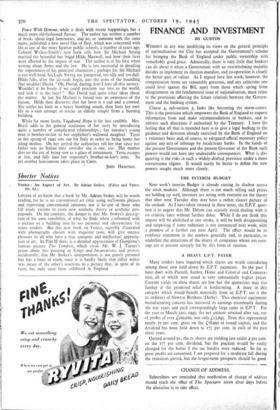FINANCE AND INVESTMENT
BY CUSTOS
WrrHour in any way modifying its views on the general principle of nationalisation the City has accepted the Government's scheme for bringing the Bank of England under public ownership with remarkably good grace. Admittedly, there is very little that bankers can do about it when a Government with an overwhelming majority decides to implement its election mandate, and co-operation is clearly the better part of valour. As I argued here last week, however, the compensation terms are reasonably generous, and any criticisms one could level against the Bill, apart from those which spring from disagreement on the fundamental issue of nationalisation, must relate to the provisions affecting the future relations between the Govern- ment and the banking system.
Clause 4, sub-section 3, looks like becoming the storm-centre. This is the provision which empowers the Bank of England to request information from and make recommendations to bankers, and to enforce such directions if authorised by the Treasury. I have the feeling that all that is intended here is to give a legal backing to the guidance and direction already exercised by the Bank of England on a voluntary basis and, of course, to safeguard official monetary policy against any acts of sabotage by recalcitrant banks. In the hands of the present Government and the present Governor of the Bank such powers would not have any undesirable consequences. What is dis- quieting is the risks in such a widely-drafted provision under a more venturesome regime. It would surely be better to define the new powers sought much more closely.
THE INTERIM BUDGET Next week's interim Budget is already casting its shadow across the stock markets. Although there is not much selling and prices are holding up well, investors are acting with restraint on the theory that after next Tuesday they may have a rather clearer picture of the outlook. As I have often stressed in these notes, the E.P.T. ques- tion is so urgent that Mr. Dalton can scarcely avoid dealing with it on realistic lines without further delay. While I do not think this impost will be abolished at one stroke, it will be both disappointing and surprising if some reduction is not announced next week, with a promise of a further cut next April. The effect would be to reinforce sentiment in the markets generally and, in particular, to underline the attractions of the shares of companies whose net earn- ings are at present severely hit by this form of taxation.
A HEAVY E.P.T. PAYER
Many readers have inquired which shares are worth considering among those now held down by E.P.T. payments. In the past I have dealt with Purnell, Sanbra, Home and Colonial and Cementa- tion, all of which now stand at very substantially higher prices. Current yields on these shares are low but the quotations may rise further if the promised relief is forthcoming. A share in this category which would benefit materially from an E.P.T. cut is the 2s. ordinary of Newton Brothers (Derby). This electrical equipment manufacturing concern has increased its earnings enormously during the war yers and paid correspondingly large sums in E.P.T. For the year to March 31st, 1945, the net amount retained after tax, out of profits of over £roo,000, was only £13,645. Even this represented nearly 35 per cent. gross on the £78,992 of issued capital, and the dividend has been held down to 174 per cent. in each of the past three years.
Quoted around 9s., the 2S. shares are yielding just under 4 per cent. on the 171 per cent. dividend, but the position would be vastly changed for the better if the tax burden were reduced. So far as gross profits are concerned, I am prepared for a moderate fall during the transition period, but the longer-term prospects should be good.


























 Previous page
Previous page